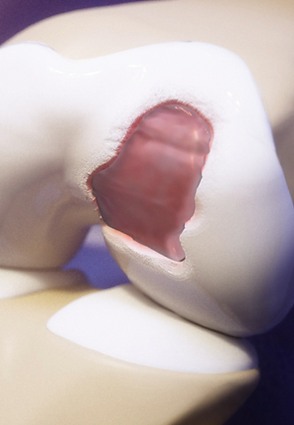

JointRep® relies on the unique characteristics of Chitosan


Chitosan is found throughout much of the sea wildlife, especially in crustacean shells, and also in some fungal species. It has the unique property among naturally occurring biopolymers of being polycationic – at physiological pH, it bears positive charges. This property is responsible for many beneficial aspects of chitosan, the first of which being its bioadhesive nature, owing to the fact that mucosal surfaces typically bear negative charges.
Hydrogels are polymer-based materials with very high water content. Due to their similarity to extracellular matrix, they find many uses in regenerative medicine and other biomedical applications. JointRep® is a perfect example when it comes to orthopedics, using a chitosan-based hydrogel for the repair of cartilage defects.


JointRep® was tailored to be injectable with enough setting time to allow for a convenient application, while gelling rapidly at body temperature once administered. With the use of an injectable hydrogel, the cartilage lesion can be odd shaped, and this is not a problem, as the viscous substance adapts perfectly to the contours of the lesion, whatever its shape is.
JointRep® follows a simple mode of action to enhance healing
Cartilage defects are generally arthroscopically treated by a surgical procedure known as bone marrow stimulation or microfracture. The process involves creating several small channels across the debrided cartilage defect to access bone marrow and create a path for cells to produce new cartilage. JointRep® enhances microfracture as a scaffold covering the defect. The mode of action can be summarized into the following:
-
Stabilizes the naturally occurring blood clot
-
Turns natural clot into a hybrid one: (chitosan hydrogel + bone marrow elements + synovial factors)
-
Provides structural framework for subsequent cellular ingrowth from an inherent source
-
Generates an adhesive bond between hybrid clot and cartilage lesion boundaries (cationic properties)


